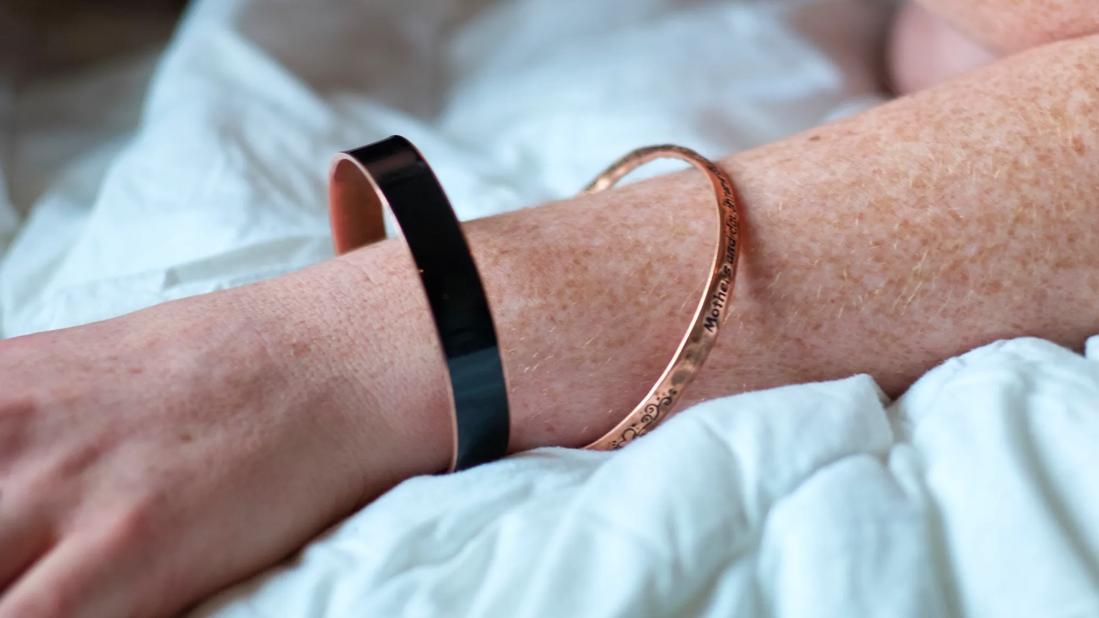Research doesn’t show any benefits to wearing copper bracelets — but your experience may vary

Image content: This image is available to view online.
View image online (https://assets.clevelandclinic.org/transform/f20c11d0-bfdf-4ccf-9884-cf241b668058/copper-bracelets-arm-640354942)
An arm with two copper bracelets on
If you’re looking for a solution to arthritis pain, there’s good reason to look for relief. It can be frustrating and tiring to live with the stiffness and swelling that can make even holding your morning cup of coffee a chore.
Advertisement
Cleveland Clinic is a non-profit academic medical center. Advertising on our site helps support our mission. We do not endorse non-Cleveland Clinic products or services. Policy
So, when you read or hear about the supposed benefits of copper bracelets and their effects on people living with arthritis (and a host of other woes), you want to believe it.
But is it for real? Can wearing a copper bracelet really make that big of a difference?
We talked with wellness and preventive medicine specialist Robert Saper, MD, MPH, about the claims made about the benefits of copper bracelets.
Copper helps your body make red blood cells, support brain function and keep your bones healthy, among other benefits. So, you could say that, in a way, yes, copper is healing. It’s an essential trace mineral that we all need in our diets.
“Essential means our bodies need it in order to function properly,” Dr. Saper explains. “Trace means that we only need it in very small amounts.”
But that’s all based on copper as a nutrient in the foods we eat. When you consider the potential for copper jewelry to have healing properties ... it’s a different story.
“The theory behind copper bracelets is that by wearing the metal, your body will absorb tiny particles of copper and enjoy certain medicinal benefits from that,” Dr. Saper shares. “But that theory hasn’t been proven in any meaningful scientific way.”
Advertisement
Copper bracelets are perhaps best known as a pain-relieving remedy for people living with arthritis of the hands and wrists. Some may tell you that copper bracelets can benefit your well-being in a variety of other ways, too, like:
The trouble is that none of those claims have been shown by reliable research studies. In fact, a 2013 research study concluded that wearing a copper bracelet was no better than wearing a placebo bracelet at relieving pain or improving function in people with arthritis.
If copper bracelets don’t actually fix things, why do so many people continue to wear them?
Because sometimes, the placebo effect is enough to do the job.
“Even if they don’t physically transfer a medical benefit, that doesn’t mean they can’t make you feel better,” Dr. Saper notes.
In other words, there’s no medical reason that a copper bracelet would change anything about your sleep, your pain or any other factor related to your health. But you still might feel like it does.
Our minds are funny like that. If you expect your copper bracelet will improve your arthritis symptoms, you may feel better. And that’s worth something.
But proceed with caution. There’s no obvious harm in wearing a copper bracelet. It’s not going to hurt you (unless you’re allergic to it or wearing it so tight that it limits your circulation).
The problem lies in choosing to wear one in place of seeking scientifically sound treatments. Arthritis can advance quickly without proper treatment. And a copper bracelet isn’t going to stop that. So, don’t delay seeking medical advice.
Advertisement

Sign up for our Health Essentials emails for expert guidance on nutrition, fitness, sleep, skin care and more.
Learn more about our editorial process.
Advertisement
Yes, your genetic makeup may increase your risk of developing arthritis, but other factors like age and weight can play a role, too
Both types of therapy work differently, but they can both alleviate symptoms — especially when you alternate methods
The process usually starts with your primary care provider, who may refer you to a rheumatologist or orthopaedist
Exercising can actually improve arthritis symptoms — and low-impact exercises are best
Simple exercises like tendon glides and finger lifts can have a big impact
Research is inconclusive, so don’t stop eating tomatoes, potatoes and peppers just yet
Adding these simple foods to your diet can make a big difference
Here's how to make yourself more comfortable behind the wheel
Although it could be used as a moisturizer, this new trend is not recommended
Communicating clear limits helps protect your time, energy and emotional well-being
High cholesterol can be genetic, but testing and treatment can lower your heart disease risk